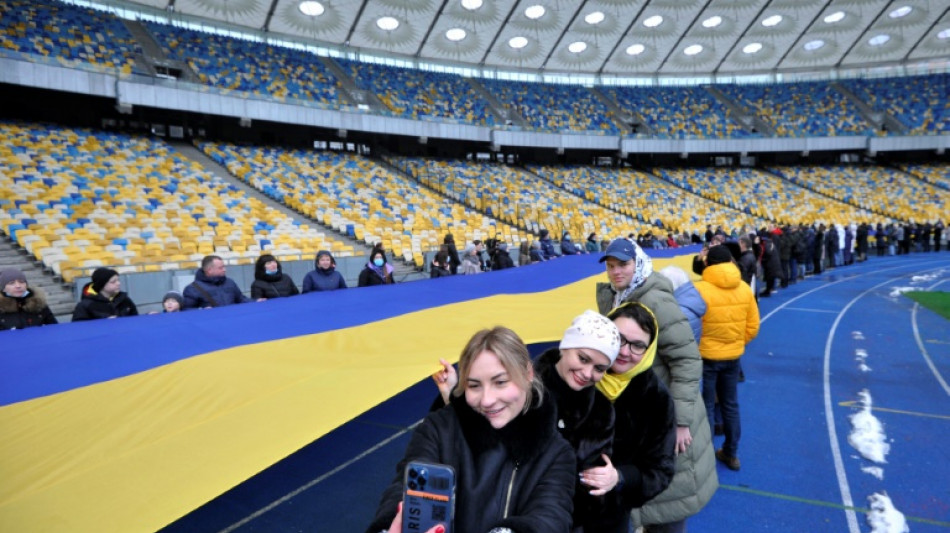

Ukraine stages drills as NATO and US see no Russia pullback
Ukraine staged military drills and defiant displays of flag-waving patriotism on Wednesday as Western powers warned Russia is continuing to mass forces for a possible invasion.
Ukraine's President Volodymyr Zelensky watched troops training with some of their new Western-supplied anti-tank weapons on a range near Rivne, west of the capital.
The demonstration of Ukrainian firepower contrasted with images on Russian state media that were said to show Moscow's forces bringing an end to a major exercise in occupied Crimea.
In Rivne, a row of vehicles was destroyed by simultaneous missile test strikes and armoured vehicles manoeuvred and fired on the yellowing moorland, while in Kyiv hundreds of civilians marched in a stadium with an enormous national banner.
"I see beautiful manoeuvres," Zelensky told officers. "I thank you for defending our state. When I see you I have confidence in the future and in our present moment."
The "Day of Unity" displays came as the Kremlin called for "serious negotiations" with Washington, and European leaders pushed hard for a diplomatic resolution to the crisis.
But NATO chief Jens Stoltenberg, hosting the alliance's defence ministers in Brussels, dismissed suggestions that the threat on the border had diminished.
"We are of course monitoring very closely what Russia does in and around Ukraine. What we see is that they have increased the number of troops and more troops are on their way," he said.
And US Secretary of State Antony Blinken told ABC News: "What we're seeing is no meaningful pullback."
- 'Signals give us hope' -
Russia's huge build-up of troops, missiles and warships around Ukraine -- which US intelligence warns could turn quickly into an invasion -- is being billed as Europe's worst security crisis since the Cold War.
Russian President Vladimir Putin has demanded Ukraine be forbidden from pursuing its ambition to join NATO and wants to redraw the security map of eastern Europe, rolling back Western influence.
But, backed by a threat of crippling US and EU economic sanctions, Western leaders have launched a drive to seek a negotiated settlement, and Moscow has signalled it will start to pull forces back.
In the latest such move, on Wednesday the Russian defence ministry said military drills in Crimea -- a Ukrainian region Moscow annexed in 2014 -- had ended and that troops were returning to their garrisons.
Washington has demanded more verifiable evidence of de-escalation, but US President Joe Biden has nevertheless vowed to push for a diplomatic solution.
Kremlin spokesman Dmitry Peskov welcomed this, telling reporters: "It is positive that the US president is also noting his readiness to start serious negotiations."
German Defence Minister Christine Lambrecht, arriving at the NATO talks, said reports of a partial Russian pullback "are signals that at least give us hope. But it is important to observe closely whether these words are followed by deeds."
EU leaders, already gathered in Brussels for a summit with their African counterparts, are now to hold impromptu crisis talks on Russia and Ukraine on Thursday.
Zelensky has downplayed threats of an immediate Russian invasion, but is attempting to rally his people with the "Day of Unity" celebrations under Ukraine's blue and gold banner.
On Wednesday, after the Rivne drills, he was to visit Mariupol, a frontline port city near a breakaway region held by Russian-backed separatists.
In a video message, the 44-year-old former television actor said flags would fly across the country and that the national anthem "Ukraine has not yet died" would be sung.
"Great people of great Ukraine! This day is ours," he declared.
The European Union ambassador to Ukraine, Matti Maasikas, along with the German, Estonian, Polish and Spanish envoys were headed to Mariupol with the president in solidarity.
Maasikas also said that he had raised the Ukrainian flag alongside the EU one at his embassy, adding: "Not sure it's fully according to the rules, but these are extraordinary times."
In Kyiv, the capital's deputy mayor Valentyn Mondryivsky said headteachers have been given guidance on "emergency situations" and that bomb shelters would be available at all schools.
- Rich return -
In another sign of Ukraine's most powerful figures coming together, some wealthy business leaders who had been urged to come back to the country announced their return.
Ukraine's richest man, 55-year-old billionaire industrialist Rinat Akmetov, who was born in Donetsk in an area now held by separatists, was in Mariupol.
"We continue to build, we continue to invest," he said, promising his firm would boost salaries and support a local university.
On Tuesday, Ukraine said the websites of the country's defence ministry and armed forces as well as two banks had been hit by a cyberattack of the kind that US intelligence fears would precede a Russian attack.
"It cannot be excluded that the aggressor is resorting to dirty tricks," Ukraine's communications watchdog said, in reference to Russia.
burs-dc/jbr/cb
李-X.Lee Li--THT-士蔑報




